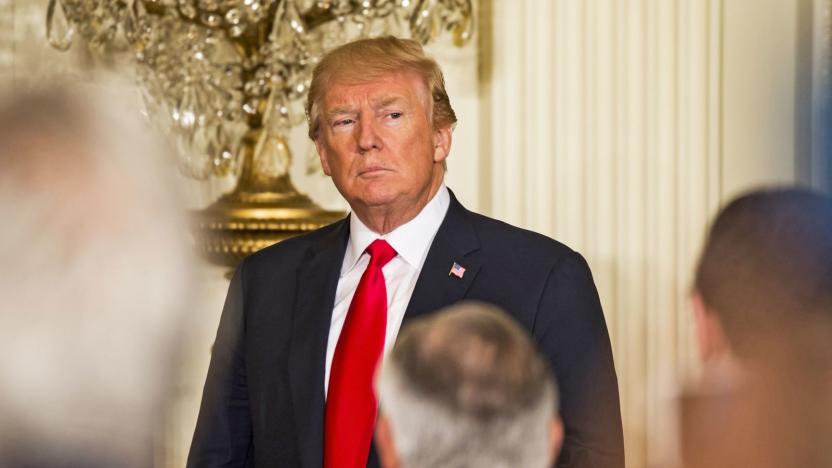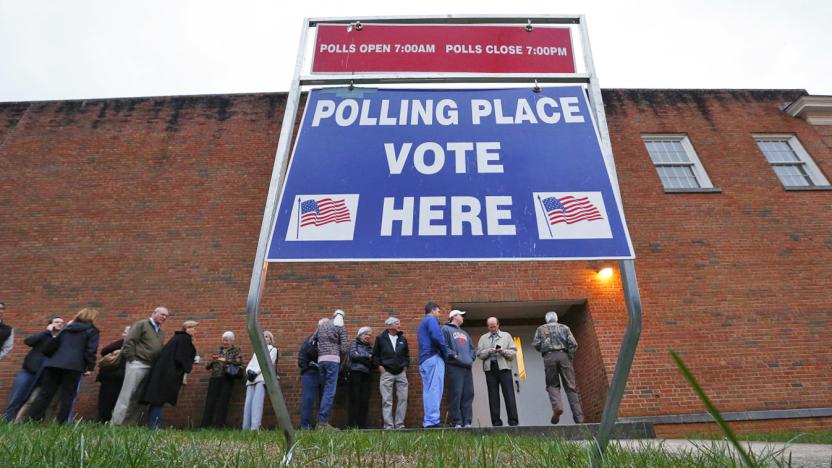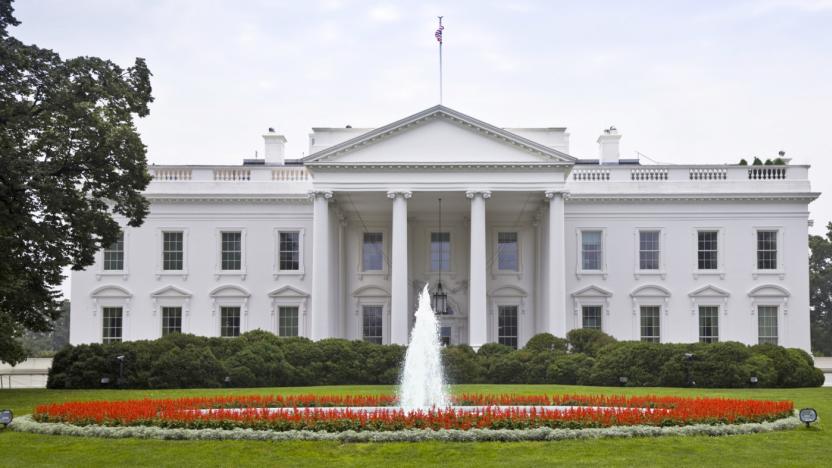democrat
Latest

Iowa Caucus results delayed, link to mobile app problems is unclear (updated)
Technology is already creating hiccups for the 2020 election mere hours into the caucuses. Democratic county chairs in Iowa told Bloomberg that precinct chairs were having problems downloading or signing into the mobile app used to tabulate and share results from the roughly 1,700 sites. They could still provide results through a phone line, but the problems threatened to delay reporting on results for hours.

After Math: Where are the adults
It's been quite the week of tantrums by the man-babies who run some of the largest companies in the tech industry. While Elon Musk cried and stamped his feet through what should have been a softball 60 Minutes interview, Twitter head Jack Dorsey spent much of his week encouraging everybody to visit sunny, genocidal Myanmar. And let's not even get started on what have become Mark Zuckerberg's weekly Facebook fiascos. Still, it's nice to see that at least some online institutions still have grownups behind the wheel.

DNC sues Russia, Trump campaign and WikiLeaks over 2016 hack
While Special Counsel Robert Mueller's investigation into Russia's role in the 2016 election continues, the Democratic National Committee has decided to take action of its own. According to the Washington Post, the DNC this morning filed a multi-million dollar lawsuit accusing (among others) the Russian government, WikiLeaks and key officials inside Donald Trump's presidential campaign of computer fraud, racketeering, data theft and more, all in hopes of swaying the outcome of a presidential election.

Cram for Super Tuesday with Engadget's election guide
On March 1st Alabama, Arkansas, Colorado, Georgia, Massachusetts, Minnesota, Oklahoma, Tennessee, Texas, Vermont and Virginia will cast their votes in the primaries and caucuses. Plus Alaska and Wyoming are having Republican caucuses and American Samoa is getting in on the action with its own Democratic caucus -- there's a reason they call it "Super Tuesday." And from here on out things start moving pretty fast. In the next seven days nearly two dozen states and territories will have their say in who should be the nominee for the two major parties. Yes Primary season is really hitting it's stride. But don't think you're done with the debate drama. Thursday, March 3rd, the Republican candidates still hanging on after Super Tuesday will face off in Detroit. You can watch that showdown at 9PM ET either on Fox News or at foxnews.com. Then on the 6th, Bernie Sanders and Hillary Clinton will face off in Flint, Michigan, site of the disastrous water contamination scandal that has put the local government under sharp criticism. The two remaining Democrats will take the stage at 8PM ET on CNN and at CNN.com. And, of course, before those showdowns kick off, make sure to get caught up on the candidates positions on the most pressing tech and science issues of 2016 in our election guide. And make sure to join in the conversation on Twitter, Facebook, Instagram, Ello, Google+, BBS or semaphore using the hashtag #engadgetelectionguide.

Prep for the debates and primaries with Engadget's election guide
Last week Iowa voted and there were surprises all around. Ted Cruz became the front runner in the Republican race and Marco Rubio made an excellent showing by coming in a close third. Plus Hillary Clinton only narrowly avoided an upset from Larry David impersonator Bernie Sanders. Add to that the rather contentious (and meme-inspiring) debate between the Republicans on Saturday and this week is looking to be a decisive one for the Candidates.

How to watch this week's presidential primary debates
Primary season is officially underway, but don't think that the deluge of debates is over. There will be many, many, many, more chances for the candidates to face off on stage. Tonight at 9pm ET Hillary Clinton and Bernie Sanders will follow up their razor thin race in Iowa by bringing their sales pitches to New Hampshire. With Martin O'Malley officially out of the race, it will be down to just the two front runners. You can watch the debate live on MSNBC and at MSNBC.com. Saturday night, at 9pm ET, its the Republicans turn to put on a debate for the citizens of New Hampshire. You'll be able to watch that on your local ABC affiliate or online at abcnew.go.com/live. And, of course, before those showdowns kick off, make sure to get caught up on the candidates positions on the most pressing tech and science issues of 2016 in our election guide. And make sure to join in the conversation on Twitter, Facebook, Instagram, Ello, Google+, BBS or semaphore using the hashtag #engadgetelectionguide.

Prep for the Iowa caucuses: Check out the Engadget Election Guide
Tonight the process of selecting the nominees for president from the Democratic and Republican parties officially gets underway in Iowa. The citizens of the Hawkeye State will gather and physically organize themselves into groups supporting each of the candidates. And at the end of the night delegates will be awarded to the candidates accordingly. As the first contest of the primary season the Iowa caucuses garner a lot of attention. They have not always, however, been a reliable indicator of who the eventual nominee would be. That being said, they can give candidates an early boost in the polls. If you're wondering exactly how a caucus works and how it's different from a primary, check out the excellent video from CPG Grey after the break. But before you go out and cast your vote tonight, make sure to read up on the candidates' positions on the most important tech and science issues facing America this election year.

Hawaii's proposed online tracking law comes under fire from ISPs, civil libertarians
There may be some trouble brewing in paradise, thanks to a seemingly draconian law currently under consideration in Hawaii's state legislature. If passed, H.B. 2288 would require all ISPs within the state to track and store information on their customers, including details on every website they visit, as well as their own names and addresses. The measure, introduced on Friday, also calls for this information to be recorded on each customer's digital file and stored for a full two years. Perhaps most troubling is the fact that the bill includes virtually no restrictions on how ISPs can use (read: "sell") this information, nor does it specify whether law enforcement authorities would need a court order to obtain a user's dossier from an ISP. And, because it applies to any firm that "provides access to the Internet," the law could conceivably be expanded to include not just service providers, but internet cafes, hotels or other businesses. Democratic Representative John Mizuno is the lead sponsor of the bill, though his support already seems to be waning. Not long after H.B. 2288 was introduced, Republican Representative Kymberly Pine told CNET that she would be withdrawing her support for it, adding that her intent was not to track Hawaiian web surfing, but to simply protect "victims of crime." "We do not want to know where everyone goes on the Internet," Pine explained. "That's not our interest. We just want the ability for law enforcement to be able to capture the activities of crime." Pine went on to acknowledge that the proposal has come under fire from many civil libertarians and internet companies within the state, and that the measure will likely be revised. In retrospect, she said, the concept of storing personal information "was a little broad," and Hawaii's lawmakers "deserved" the criticism they received during today's hearing.

Senate to vote on net neutrality repeal today, Obama counters with a veto threat (update: 52-46 vote in favor of net neutrality)
The US Senate is slated to vote on a repeal of the FCC's controversial net neutrality regulations today, just a few days before they're scheduled to go into effect. Today's vote, like most these days, is expected to be divided along party lines, with most Democrats standing in favor of the rules, and Republicans calling for them to be overturned. Texas Republican Senator Kay Bailey Hutchinson, who sponsored the resolution, claims that the FCC's regulations would obstruct innovation and investment by jeopardizing the openness upon which the web has thrived, thus far. "The internet and technology have produced more jobs in this country than just about any other sector," Hutchinson argued. "It has been the cradle of innovation, it does not have a problem, and it does not need fixing." Senate Republicans aren't the only ones taking issue with the rules, either. Both Verizon and MetroPCS have already publicly aired their grievances, with the former filing a formal appeal in late September. But Senate Commerce Chairman Jay Rockefeller believes the GOP-led opposition won't be strong enough to overcome his Democratic majority. "There's still 53 of us, and if we stay together we'll win," Rockefeller said. "I think we're going to prevail." Even if they don't, they'll still have the backing of the White House, which has already threatened to veto the resolution, should it survive past the Senate floor. "It would be ill-advised to threaten the very foundations of innovation in the Internet economy and the democratic spirit that has made the Internet a force for social progress around the world," the White House said in a statement, adding that the FCC's rules provide an "effective but flexible" means of preserving the web's intrinsically wild, wild west nature. Rockefeller, however, certainly isn't banking on a presidential veto to bail his party out. "You can take the cheap way out and just say, 'What if we fail, then Obama will veto it,'" he explained. "But that speaks so badly of us." All told, it's shaping up to be another net neutrality showdown on the Hill, but we'll keep you updated on the latest developments. Update: It wasn't an overwhelming victory, but the Senate today rejected the attempt to repeal the FCC's net neutrality rules in a 52 to 46 vote that fell largely along party lines.

Senator Schumer blasts OnStar for 'brazen' privacy violation, calls for FTC investigation
Last week, OnStar issued a privacy notice informing customers that it would continue to collect data on vehicles still connected to its servers, even for those who have already canceled their subscriptions. The move elicited a chorus of protests from Democratic privacy advocates in the Senate, including Chris Coons, Al Franken and, most recently, Charles Schumer, who wrote a letter to the FTC yesterday calling for an investigation into what he sees as a bold violation of consumer rights. "By tracking drivers even after they've canceled their service, OnStar is attempting one of the most brazen invasions of privacy in recent memory," the New York Senator said. "I urge OnStar to abandon this policy and for FTC to immediately launch a full investigation to determine whether the company's actions constitute an unfair trade practice." Find out more about OnStar's new policy, after the break.

US Senate passes patent system reform bill, Obama expected to sign into law
Think it's time to change our patent system? So does Congress. Yesterday, the Senate approved the America Invents Act by an 89-8 vote that could bring about the most drastic changes to the US Patent and Trademark Office (USPTO) in five decades. Under the bill, which the House approved back in June, patents would be awarded not to the first person to invent a technology, but to the first one to actually file with the USPTO, bringing US policy in line with protocol adopted in most other countries. It also calls for a streamlined application process and would allow the USPTO to charge set fees for all apps. The revenue generated from these fees would go directly to a capped reserve fund, allowing the office to retain the lion's share of the money, rather than funneling much of it to Congress, as had become the norm. Supporters say this extra revenue will give the USPTO more power to chip away at its backlog of some 700,000 patent applications, while a new third-party challenge system will help eliminate patents that should've never received approval in the first place. Opponents, meanwhile, criticized the bill for not eliminating fee diversion altogether (an amendment that would've placed more severe restrictions was ultimately killed, for fear that it would jeopardize the bill's passage), with Washington Democratic Senator Maria Cantwell questioning the legislation's impact on small businesses, calling it "a big corporation patent giveaway that tramples on the rights of small inventors." But Senator Patrick Leahy, a Vermont Democrat who sponsored the bill, argued that yesterday's approval marks a major and historic inflection point in US patent policy: The creativity that drives our economic engine has made America the global leader in invention and innovation. The America Invents Act will ensure that inventors large and small maintain the competitive edge that has put America at the pinnacle of global innovation. This is historic legislation. It is good policy. The America Invents Act will now make its way to President Obama's desk, where it's expected to receive his signature. For more background on the legislation, check out the links below.

Breakfast topic: When real life is greater than WoW
Believe it or not, there are things out there that are more important than a computer game. Occasionally you need to turn off WoW and go do something like eat, bathe, sleep, engage in some form of non-finger exercise, etc...One of the problems with a MMORPG like WoW is that some people often get consumed in the dynamic social and entertainment parts of the game, leaving off activities and events happening in the real world. This is problematic for a number of reasons, and is something that everyone who plays this game a lot should guard against happening to them. And with that in mind, today I heartily recommend that you take a respite from our Azerothian domain and head over to the television to watch some of the presidential inauguration. No matter if you're a democrat or a republican or a whig, watching the historic swearing in of America's first African American commander-in-chief is something that you'll want to be able to tell your children and grandchildren about. The last thing you'll want to say was "I was playing WoW with all those cool 3.0.8 changes."

World of Warcraft's top five political contributions of 2008
With World of Warcraft having the combined worldwide population of a small country, and the combined US population of a small state, people have been finding various ways to infuse their politics into the game. This can only be seen as a natural occurrence – people will naturally want to bring their out of game ideals into the game to express themselves.We've covered various politically and socially minded groups in the past here and there. And with the end of the political season we've seen an increase in the number of political expressions in WoW.Let's take a look back at the top five politically and socially relevant WoW thing-a-ma-jigs on the net in 2008.

MMO industry heavyweights outed on political affiliations
The Gamepolitics site is a never-ending font of fascinating information. A recent post on donations from games industry notables touches heavily on the MMO industry, with several big names popping off the list. Both sides of the political fence are represented, according to the publicly available records searchable on the Newsmeat.com website. Here are some of the MMO industry's political backers: John Smedley, President of SOE: $2300 to the Obama campaign. Richard Garriott, NCsoft: Thousands to the Clinton campaign, more to Democratic senators and the party itself. Curt Schilling, President of 38 Studios: $2300 to the McCain campaign. John Riccitiello, President of EA: Thousands to the Obama campaign. Michael Morhaime, President of Blizzard Entertainment: Contributions to both Democrats and Republicans. The conclusion the site draws is that, generally speaking, games makers tend to support democratic candiates. Read the full post at Gamepolitics for more from the games industry as a whole.

Panasonic HDTVs take center stage at Democratic National Convention
Besides being covered in high definition for the first time, tonight when the Democratic National Convention kicks off, while comparing HD feeds, we'll be looking out for the three 103-inch Panasonic plasmas conveniently located behind the podium. As the "official" HDTV and High Definition Equipment provider it's also dropping 200 Viera Plasmas, 52 HD camcorders and DSLR cameras, 40 HD production monitors, two HD projectors and 100 laptops on the Obama/Biden camp. Of course we wonder where the 150-inch plasma is, but since appearing "elite" has already been a problem, we can see why they'd select a 103-inch model that's owned by at least one friend of ours. We wonder if anyone's vote will hinge on the all important issue of LCD vs. plasma.Update: You can check 'em out now on the live HD Silverlight / Move Networks powered stream at the Democratic National Convention website, along with hilariously out of sync and delirious dancing courtesy of convention attendees.

Senator pushes for expansion of "V-chip" video censorship technology
The Democratic Senator for Arkansas -- Mark Pryor is his name -- wants to expand on the "V-chip" video content blocking program, and create a tracking system that could enable parents to censor content on platforms including TV, DVD, and the internet. A new bill proposed by Senator Pryor calls for the FCC to look into ways of blocking "indecent and objectionable programming, as determined by the parent" on basically all platforms capable of displaying images. As always, the devil is in the details: how exactly the FCC is going to figure out a method for precisely tracking obscenities on a "platform blind" basis remains to be seen, and the issue of classification of content is always sure to cause controversy. What politicos like Pryor always seem to miss is the fact that parental filters are already in place, albeit in messy meatspace form.





